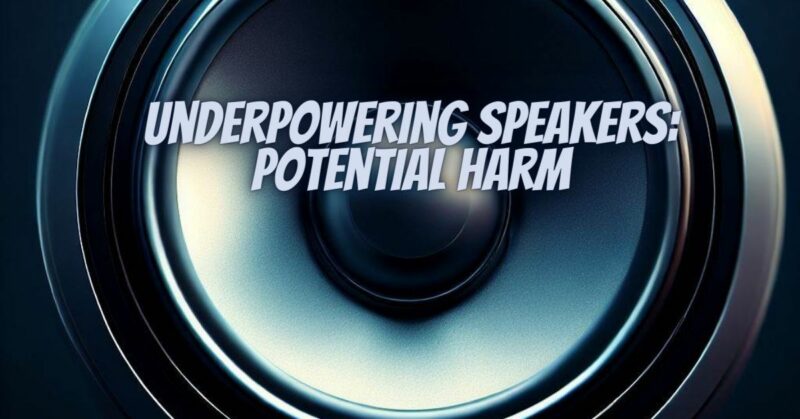Speakers are the heart of any audio system, responsible for transforming electrical signals into audible sound. The power they receive from an amplifier is a crucial factor in their performance. While it’s essential to match speakers with an appropriate amplifier, underpowering them can lead to potential harm and negatively impact your listening experience. In this article, we’ll explore the risks and downsides of underpowering speakers and why it’s important to provide them with adequate amplification.
Understanding Underpowered Speakers
Underpowered speakers refer to speakers that receive less power from an amplifier than they require for optimal performance. In this scenario, the amplifier’s wattage output is lower than what the speakers need to operate effectively.
Risks and Downsides of Underpowered Speakers
1. Distortion:
- Clipping: Underpowered amplifiers are more likely to clip, a form of distortion that occurs when the amplifier attempts to deliver more power than it can. Clipping leads to the generation of harmonic distortions that significantly degrade sound quality.
- Audible Distortion: Clipping and distortion are not only detrimental to the speakers but also to the overall audio experience. Audible distortion can be highly noticeable and unpleasant.
2. Reduced Dynamic Range:
- Limited Headroom: Underpowered speakers lack headroom, which is the ability to handle transient peaks in the audio signal. Without headroom, the speakers may struggle to reproduce dynamic sounds accurately.
- Loss of Impact: The lack of dynamic range can result in a loss of impact and excitement in audio content, particularly in music and movie scenes with sudden volume changes.
3. Mechanical Stress:
- Overdriving the Speakers: Underpowered amplifiers can push speakers beyond their mechanical limits. The speaker’s driver (cone) may experience excessive stress, leading to damage over time.
- Decreased Longevity: Continuous operation of underpowered speakers in this manner can significantly reduce their lifespan, requiring costly repairs or replacements.
4. Inefficiency:
- Inefficient Power Transfer: When speakers are underpowered, they may not efficiently convert the amplifier’s output into sound. This inefficiency can lead to wasted electrical energy and increased heat generation.
5. Inadequate Sound Pressure Levels (SPL):
- Limited Volume: Underpowered speakers may not achieve the desired sound pressure levels, especially in larger rooms or outdoor settings. This limitation can result in an unsatisfactory listening experience, particularly for live performances or events.
6. Speaker Damage:
- Burned Voice Coils: Underpowered speakers are at risk of overheating their voice coils, leading to permanent damage. Burned voice coils can cause speakers to become inoperable.
- Torn Cones: The mechanical stress caused by insufficient power can result in torn or damaged speaker cones, which negatively affect sound quality.
7. Loss of Detail:
- Inadequate Resolution: Underpowered speakers may struggle to reproduce subtle details in music, leading to a loss of nuance and clarity in the audio.
Avoiding Underpowered Speakers
To prevent the risks and downsides associated with underpowered speakers:
- Match RMS Ratings: Ensure that the amplifier’s RMS (Root Mean Square) power output matches or slightly exceeds the speaker’s RMS power handling rating. This ensures that the speakers receive the necessary power without underpowering or overpowering.
- Consider Room Size: Larger rooms may require more powerful amplifiers and speakers to provide consistent and impactful sound throughout the space.
- Avoid Clipping: Monitor for audible distortion or clipping, which is a sign that the amplifier is struggling to provide sufficient power. Reduce the amplifier’s output if clipping occurs.
- Review Manufacturer Recommendations: Manufacturers often provide guidelines for matching their speakers with compatible amplifiers. Follow these recommendations for a reliable match.
In conclusion, underpowered speakers can result in distortion, reduced dynamic range, mechanical stress, inefficiency, inadequate sound pressure levels, speaker damage, and a loss of detail in audio reproduction. To ensure optimal speaker performance and sound quality, it’s essential to provide them with adequate amplification that matches their power requirements. A well-matched speaker and amplifier combination enhances your audio experience, delivering clear, detailed, and impactful sound for music, movies, and other audio content.


